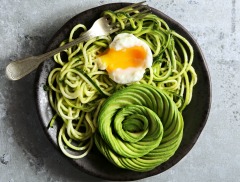Don't just meal plan... meal plan intelligently - with Meal Genius! Sign up for our free newsletter to get delicious recipes, sample meal plans and a whole lot more!
Squash
Squash is a flowering vegetable and native to the Americas. In fact, its culinary history dates back to Mexico as far back as 5500 B.C.
Squash varies greatly in size, shape, color and flavor. In general, squash is divided into two categories — summer squash and winter squash.
Summer squash - like crookneck, pattypan and zucchini - are quick cooking and have thin, edible skins, soft seeds, tender flesh and a high water content.
In contrast, Winter squash - including Acorn, Butternut, Hubbard, Spaghetti and Turban - have hard, skins and seeds and firm flesh which requires lengthy cooking.
Squash is a low calorie, low glycemic food that is versatile and can be cooked in a myriad of ways.
Antioxidant Score (ORAC)=180 and 396
*Summer squash, zucchini (180) and Winter squash, butternut (396)
The Benefits
- Special diets: Gluten-Free Diet, Gluten-Free/Dairy-Free Diet, Grain-Free Diet, Low Acid Diet, Low FODMAP Diet, Low Oxalate Diet, Low Starch Diet, Paleo Diet (Light), Paleo Diet (Strict), Pescetarian Diet, Primal Diet, Vegetarian Diet, Whole Food
- Excellent Source of:
- Good Source of:
- Preferences: No Fish, No Red Meat, No Pork, No Eggs, No Shellfish, No Gluten, No Nuts, No Soy, No Dairy, No Poultry, No Molds, No Citrus, No Coconut, No Pseudograins, No Corn, No Yeast, No Peanuts, No Nightshade, No Legumes, No Grains, Low Carbohydrate, Low Cholesterol, Low Fat, Low Sodium, Low Sugars, Low Saturated Fat
Related Foods
Related Nutrients
Selecting and Storing
Store squash in the crisper of the refrigerator. Use within 1 week.









